

OCTOBER • VOL. 8 • SERIES OF 2023
INSIGHTS is a monthly publication of BDB LAW to inform, update and provide perspectives to our clients and readers on significant tax-related court decisions and regulatory issuances (includes BIR, SEC, BSP, and various government agencies).

DISCLAIMER: The contents of this Insights are summaries of selected issuances from various government agencies, Court decisions, and articles written by our experts. They are intended for guidance only and as such should not be regarded as a substitute for professional advice.
Copyright © 2023 by Du-Baladad and Associates (BDB Law). All rights reserved. No part of this issue covered by this copyright may be produced and/or used in any form or by any means – graphic, electronic, and mechanical without the written permission of the publisher.
What's Inside ...
- HIGHLIGHTS FOR SEPTEMBER 2023
- SIGNIFICANT COURT DECISIONS
- Court of Tax Appeals
- SIGNIFICANT REGULATORY ISSUANCES
- Bureau of Internal Revenue
- Securities and Exchange Commission
- Insurance Commission
- Bureau of Customs
- Fiscal Incentives Review Board
- PUBLISHED ARTICLE
- VAT on Incidental Transactions
- OUR EXPERTS
- The Personalities
- The Personalities


HIGHLIGHTS for SEPTEMBER 2023
COURT OF TAX APPEALS DECISIONS
-
Compromise amount offered must be paid before the application for compromise settlement may be processed, and that in cases where the compromise application is disapproved, the amount paid shall be deducted from the total outstanding tax liabilities. (Barrio Fiesta Manufacturing Corp. v. Commissioner of Internal Revenue, C.T.A. Case No. 10483, September 4, 2023)
-
Cooperatives are exempt from the payment of local business taxes and real property taxes, both under the LGC and under RA No. 9520. (City Government of Tayabas v. St. Jude Multi-Purpose Cooperative, C.T.A. AC No. 254, September 6, 2023)
-
For a CWT refund to prosper, the claimant must trace the income payments subjected to CWT to the GLs of the relevant period when they were declared. (GHD Pty Ltd v. Commissioner of Internal Revenue, C.T.A. EB No. 2637, September 6, 2023)
-
If an authorized representative of the CIR denies the protest within the 180-day period and the taxpayer appeals to the CIR, the CIR has the remainder of the 180-day period within which to act. (Benguet Electric Cooperative, Inc. v. Commissioner on Internal Revenue, C.T.A. Case No. 9967, September 11, 2023)
- The lack of a valid LOA issued in favor of the current Revenue Officers (ROs), in cases of reconsideration, does not invalidate the present assessment considering that the current tax assessment was issued through the efforts of the previous ROs who were properly authorized under a LOA. (Kho v. Commissioner of Internal Revenue, C.T.A. Case No. 10308, September 14, 2023)
BUREAU OF INTERNAL REVENUE ISSUANCES
- Revenue Regulations No. 10-2023 – This amends certain provisions of RR No. 6-2019, as amended, to implement the extension on the period of availment of the Estate Tax Amnesty pursuant to RA No. 11956, further amending RA No. 11213 (Tax Amnesty Act), as amended by RA No. 11569.
- Revenue Regulations No. 11-2023 – Prescribes the use of electronic mail (e-mail) and electronic signature as additional mode of service of the Warrant of Garnishment pursuant to Section 208 in relation to Section 244 of the National Internal Revenue Code of 1997, as amended.
- Revenue Memorandum Circular No. 91-2023 – This circularizes the amendment to Rule 18, Section 5 of the Implementing Rules and Regulations (IRR) of RA No. 11534 (Corporate Recovery and Tax Incentives for Enterprises (CREATE) Act).
- Revenue Memorandum Circular No. 92-2023 – This announces the availability of BIR Form No. 1621 in the
Electronic Filing and Payment System (eFPS). - Revenue Memorandum Circular No. 93-2023 – This publishes the Updated List of registered manufacturers/importers/exporters with the corresponding product brands/variants of cigarettes, heated tobacco products, vapor products and novel tobacco products and integration of the requirements for compliance purposes.
- Revenue Memorandum Circular No. 94-2023 – This announces the availability of Online Customer Satisfaction Survey in the Online Registration and Update System (ORUS).
- Revenue Memorandum Circular No. 97-2023 – This provides tax compliance reminders to all candidates and other participants in any national or local elections, including Barangay or Sangguniang Kabataan (SK) Elections.
- Revenue Memorandum Order No. 33-2023 – This reiterates Section 3.J of RR No. 17-2003 on the withholding of taxes for the sale of real property on installment plan.
SEC ISSUANCES
- SEC MC No. 13, series of 2023 – This provides guidelines on Annex C of Rule 12 of the Securities Regulation Code Interpreting the comparative periods required in the Management’s Discussion and Analysis.
- SEC MC No. 14, series of 2023 – This provides proposed Amendments to Annex C of Rule 12 of the Securities Regulation Code.
- SEC MC No. 16, series of 2023 – This provides revised guidelines on the determination of Retained Earnings Available for Dividend Declaration.
- SEC MC No. 17, series of 2023 – This further extends the Amnesty Applications Until 06 November 2023.
INSURANCE COMMISSION ISSUANCES
- Legal Opinion No. 2023-18 dated September 8, 2023 – This provides clarification that even though the practice of charging higher premiums or limiting coverage for senior citizens may seem unfair on the surface, it is important to consider the actuarial and underwriting principles that underpin such decisions.
BUREAU OF CUSTOMS ISSUANCES
- CMO No. 15-2023, September 5, 2023 – This further amends Customs Memorandum Order (CMO) No. 04-2020 Re: Establishment of an Electronic Tracking of Containerized Cargo System (E-TRACC System) and Accreditation of a Service Provider for the purpose.
- OCOM memo 58-2023, September 5, 2023 – This provides guidance on the strict use of Multi-Currency Counting and Printing Machines in the 100% verification of currencies declared in the Currencies Declaration Form by Travelers and Crew arriving and departing in all seaport and airports.
FISCAL INCENTIVES REVIEW BOARD ISSUANCES
- FIRB Advisory 016-2023, September 14, 2023 – This provides guidance on the availability of the updated templates for the Annual Tax Incentives Report (ATIR) and Annual Benefits Report (ABR) of cooperatives.

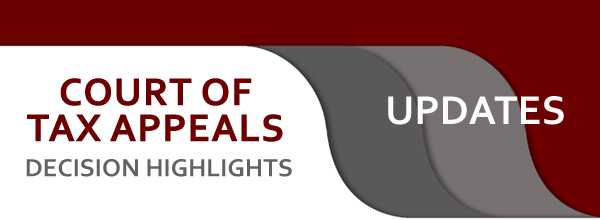
In cases where the compromise application is disapproved, the amount paid shall be deducted from the total outstanding tax liabilities.
The taxpayer argues that it has proven by a preponderance of evidence that it is entitled to the recovery of erroneously paid or illegally collected taxes, representing the compromise settlement paid which was not acted upon by the Commissioner of Internal Revenue (CIR) and yet unduly retained by it. The CIR, on the other hand, argues that the payment was made in compliance to the requirements of the compromise, which the taxpayer voluntarily entered into.
The Court decided in favor of the CIR. It ruled that Section 6 of RR No. 30-2002, as amended by RR No. 9-2013, provides that no application for compromise settlement shall be processed without the full settlement of the offered amount, and that in case of disapproval of the application for compromise, the amount paid upon filing shall be deducted from the total outstanding tax liabilities.
Based on the foregoing regulation, the amount offered must be paid before the application for compromise settlement may be processed, and that in cases where the application is disapproved, the amount paid shall be deducted from the total outstanding tax liabilities.
In this case, as petitioner itself insists, the amount of total outstanding tax liabilities has yet to be determined because they have yet to become final and executory, as they are currently pending with this Court, and may even be the subject of appeals. Accordingly, based on RR No. 30- 2002, as amended, the amount paid pursuant to the application for compromise settlement will be applied towards such outstanding tax liabilities yet to be determined, if any, and may not be the subject of a refund at this time. (Barrio Fiesta Manufacturing Corp. v. Commissioner of Internal Revenue, C.T.A. Case No. 10483, September 4, 2023)
Cooperatives are exempt from the payment of local business taxes and real property taxes, both under the LGC and under RA No. 9520.
Petitioner LGU argues that it is vested with the constitutional right to impose and collect taxes. Respondent taxpayer, on the other hand, argues that it is exempt from local business tax and real property tax pursuant to the express provisions of law.
The Court decided in favor of the respondent taxpayer. It ruled that cooperatives are exempt from the payment of local business taxes and real property taxes, both under the LGC and under RA No. 9520.
Accordingly, respondent is exempt from local taxes. The proviso in Section 61 (3) of RA No. 9520 that "all sales or services rendered for non-members shall be subject to the applicable percentage taxes except sales made by producers, marketing or service cooperatives" does not pertain to local business tax, but pertains to percentage tax under the NIRC. Nowhere in the LGC did the law pertain to local business taxes as "percentage taxes." Hence, the Court cannot construe the proviso allowing the imposition of percentage tax as granting petitioner the power to impose local business taxes on a cooperative selling to non-members such as respondent herein.
Anent respondent's exemption from real property taxes, it has already been settled by the Supreme Court in Provincial Assessor of Agusan Del Sur vs. Filipinas Palm Oil Plantation, Inc. that "all real property owned by cooperatives" are exempt "without distinction." The Supreme Court continues that "nothing in the law suggests that the real property tax exemption only applies when the property is used by the cooperative itself. Similarly, the instance that the real property is leased to either an individual or corporation is not a ground for withdrawal of tax exemption." (City Government of Tayabas v. St. Jude Multi-Purpose Cooperative, C.T.A. AC No. 254, September 6, 2023)
For a CWT refund to prosper, the claimant must trace the income payments subjected to CWT to the GLs of the relevant period when they were declared.
Petitioner taxpayer argues that it was able to establish its entitlement for refund through the submitted documents e.g. Annual ITRs, ORs and BIR Forms 2307. Respondent CIR, on the other hand, contends that the submitted documents e.g. Annual ITRs for FY 2016 and ORs are insufficient to prove that the said income was declared in 2016 as the former merely shows the gross revenues for FY 2016 while the latter only provides for the specific income payments.
The Court decided in favor of the respondent taxpayer. It ruled that in United International Pictures AB v. Commissioner of Internal Revenue, the Supreme Court denied the claim for refund of petitioner therein for its failure to submit evidence that would allow the Court to trace the discrepancy of the income stated between the certificate of taxes withheld and income tax return.
Applying the foregoing in the instant case, an examination of the records reveals that petitioner did not submit any competent evidence or documents to substantiate the noted differences between the GL and the Annual ITR. Moreover, petitioner did not make any attempt to explain the difference between the Annual ITR and the revenue stated in the AFS for FY 2016. With the glaring discrepancies noted in the supporting documents, We cannot thus share petitioner's stance. It is a basic rule that bare allegations, unsubstantiated by evidence, are not equivalent to proof. Simply, mere allegations are not evidence. (GHD Pty Ltd v. Commissioner of Internal Revenue, C.T.A. EB No. 2637, September 6, 2023)
If an authorized representative of the CIR denies the protest within the 180-day period and the taxpayer appeals to the CIR, the CIR has the remainder of the 180-day period within which to act.
Petitioner taxpayer opted to file an administrative appeal, through an Appeal on the Final Decision on Disputed Assessment (FDDA), before the CIR on 25 April 2018. On the belief that it was granted a fresh period of 180 days from 25 April 2018, petitioner claimed that the said period lapsed on 22 October 2018. Respondent CIR, on the other hand, argued that considering that about 100 days of the 180-day period have already lapsed by the time the CIR’s authorized representative have issued the FDDA on 15 March 2018, respondent CIR only had 80 days from petitioner's filing of the administrative appeal to act, i.e., until 14 July 2018. Consequently, the Respondent CIR is arguing that the CTA has no jurisdiction over the said case since it was belatedly filed.
The Court decided in favor of the CIR. It ruled that there is a singular 180-day period, i.e., the period counted from the filing of the protest or the submission of the required documents. Accordingly, if an authorized representative of the CIR denies the protest within the 180-day period and the taxpayer appeals to the CIR, the CIR has the remainder of the 180-day period within which to act. And if there is no action, the taxpayer may appeal to this Court within 30 days after the lapse of the said remaining period. It also follows that if the taxpayer waits for the decision of the CIR's representative and the same is issued after the lapse of the 180-day period, the same may be appealed to this Court. In the latter case, the 180-day period is no longer a consideration and the only remedy for the taxpayer is to wait for the CIR's decision before elevating its case to the CTA, if the same is not favorable.
Considering that about 100 days of the 180-day period have already lapsed by the time respondent issued the FDDA on 15 March 2018, respondent CIR only had 80 days from petitioner's filing of the administrative appeal to act, i.e., until 14 July 2018. After the lapse of such period, there is already an inaction on the part of respondent CIR and petitioner should have filed a judicial appeal before this Court within 30 days from the lapse of the remaining 80 days of the 180-day period, i.e., from 14 July 2018 to 13 August 2018. However, petitioner only filed a judicial appeal before this Court on 30 October 2018.
Thus, it is correct that the CTA has no jurisdiction over the case since it was belatedly filed by Petitioner. (Benguet Electric Cooperative, Inc. v. Commissioner on Internal Revenue, C.T.A. Case No. 9967, September 11, 2023)
Per the Financial or Technical Assistance Agreement, the taxpayer must show that the collection of excise tax during the Recovery Period resulted in loss or harm to its person or property.
The taxpayer is an assignee-contractor to the Financial or Technical Assistance Agreement (FTAA) entered into by the Republic of the Philippines and Arimco Mining Corporation. The FTAA is explicit that all taxes, including excise tax, collected during the Recovery Period is recoverable during the years they were incurred, provided that the amount collected is detrimental to the taxpayer’s recovery of Pre-operating and Property Expenses. Pursuant to this, the taxpayer filed a claim for refund of excise taxes.
The Court denied the refund claim. The term "detriment" means any loss or harm suffered in person or in property. Thus, per the FTAA, the taxpayer must show that the collection of excise tax during the Recovery Period resulted in loss or harm to its person or property. The taxpayer failed to prove that the payments of the subject excise taxes, during the said five (5)-year period, were detrimental to its recovery of the said Pre-operating and Property Expenses. There was no specific evidence which showed such fact. [Oceanagold (Philippines), Inc. v. Commissioner of Internal Revenue, CTA Case No. 10103, June 1, 2023]
The lack of a valid LOA issued in favor of the current Revenue Officers (ROs), in cases of reconsideration, does not invalidate the present assessment considering that the current tax assessment was issued through the efforts of the previous ROs who were properly authorized under a LOA.
A LOA was issued by Officer-In-Charge Regional Director authorizing the Revenue Officer and Group Supervisor (GS) to audit and examine petitioner's books of accounts and other accounting records for deficiency VAT covering the taxable period of 1 January 2012 to 30 June 2012. Through the efforts of the RO and GS, a PAN and an FLD/FAN were issued against the petitioner. The FLD/FAN constituted the actual assessment of deficiency taxes (i.e., deficiency VAT) against petitioner. Petitioner then filed his Protest on the FLD/FAN requesting for a reconsideration of the same. To resolve such Protest, an MOA was subsequently issued by the BIR re-assigning the case from the previous ROs to RO Torio and GS Cruz. Through the efforts of new RO and GS, the FDDA was issued against petitioner denying his Protest.
Petitioner taxpayer argues that the VAT assessment is void since the RO had no valid LOA authorizing him to perform an audit of petitioner's books of accounts and other accounting records.
The Court decided in favor of the CIR. It ruled that when the BIR docket is referred to a new set of ROs after deficiency tax assessment has already been issued such as but not limited to: a) when there is a need to resolve a Protest filed by a taxpayer against an FLD/FAN; or b) when there is a need to decide on a request for reconsideration filed by a taxpayer against an FDDA, a new LOA is not required for the new set of ROs. Primarily, this is because the new set of ROs will no longer be conducting an audit and examination of the taxpayer's books of accounts and other accounting records but will simply be reviewing the findings of the previous ROs which resulted in the already issued tax assessment. As such, at this stage, there is no longer a potential encroachment on the taxpayer's person and property which the LOA requirement was imposed to avoid. (Kho v. Commissioner of Internal Revenue, C.T.A. Case No. 10308, September 14, 2023)
Continuation of the examination and audit, in cases of reinvestigation, necessitates the issuance of a new LOA, in case the RO, who would conduct such reinvestigation, is different from the one(s) named in the previously-issued LOAs
Petitioner taxpayer primarily challenges the validity of the deficiency tax assessment as the reinvestigation conducted by the RO was not preceded by the issuance of an LOA.
The Court decided in favor of the petitioner taxpayer. It ruled that in the recently decided case of Republic of the Philippines v. Robigie Corporation, the Supreme Court emphasized that the "investigatory powers of the ROs flow from the LOA, which is the statutorily designated means by which the CIR delegates its investigative powers to the BIR revenue officers."
A reinvestigation, once granted by respondent, involves the re-evaluation of an assessment on the basis of newly discovered or additional evidence of the concerned taxpayer. Thus, it is, in effect, a continuation of the examination and audit of the latter which necessitates the issuance of a new LOA, in case the RO, who would conduct such reinvestigation, is different from the one(s) named in the previously-issued LOA. In other words, the new RO would be acting as a substitute or replacement of those named in the said LOA. (Montalban Methane Power Corporation v. Commissioner of Internal Revenue, C.T.A. Case No. 10038, September 21, 2023)
The absence of an LGU assessment containing a fixed tax due is tantamount to an assessment without definite amount which is null and void.
Petitioner taxpayer grounded its judicial action against LGU on the Letter dated June 4, 2009, demanding payment of the taxpayer’s franchise obligation without specifying the amount due and due date.
The Court decided in favor of the petitioner taxpayer. It ruled that there was no amount of deficiency tax assessment yet issued against petitioner since an assessment must contain a fixed tax due as held in Lucas G. Adamson, et al. v. Court of Appeals, et al.
Further in National Power Corporation v. The Province of Pampanga, et al., the Supreme Court ruled that assessment is void if such did not contain the amount of deficiency tax, surcharges, interest, penalties, and the due date.
The absence of an assessment containing a fixed tax due is tantamount to an assessment without definite amount which is null and void. Hence, there is no basis to remand the case to the court a quo for the substantiation of the parties' respective claim as an assessment that is null and void, bears no valid fruit. (National Power Corporation v. Province of Dinagat Islands, C.T.A. EB No. 1723, September 19, 2023)
Sec. 195 of the LGC will apply if the case emanated from the LGU’s issuance of the Notice of Assessment
Petitioner LGU insists that any question on the legality and validity of the tax ordinance should be filed before the Secretary of Justice (SOJ), and failure to do is fatal to respondent's cause. The taxpayer, on the other hand, contends that petitioners' reliance on Section 187 of the LGC is misplaced as this case seeks to nullify petitioners' deficiency assessments under Section 195 of the LGC, not the declaration of nullity of petitioners' tax ordinance.
The Court decided in favor of the taxpayer. It ruled that as the case emanated from petitioners' issuance of the Notice of Assessment, which respondent formally protested and appealed to the RTC, the petition was filed in accordance with Section 195.
And so, Section 187 of the LGC, which outlines the procedure for questioning the constitutionality or legality of a tax ordinance, does not apply.
In fact, what respondent put in issue before the RTC Makati City is whether petitioners are empowered to levy taxes on respondent's income as a holding company, the propriety of the assessments made, and whether its cancellation and nullification are warranted. Respondent did not question the legality or constitutionality of the RMRC or any of its provisions. The RTC Makati City and the Court in Division resolved the issue, among others, by declaring inapplicable the RMRC provisions incorrectly applied by petitioners in issuing the Assessment Notice. (City of Makati v. DMCI Holdings, Inc., C.T.A. EB No. 2634, September 18, 2023)
A taxpayer may still question the authority of the ROs who conducted an audit of its books of accounts and other accounting records even for the first time before this Court.
In the case at bar, petitioner CIR contends that the taxpayer is already estopped from questioning the authority of the ROs who audited Star Songs, Inc.' s books of accounts and other accounting records since it did not raise this issue at the administrative level.
The Court ruled in the negative. It held that the taxpayer's right to know the specific revenue officers who are authorized to examine his or her books of accounts and other accounting records is a due process requirement not only enshrined in the NIRC but also protected by the 1987 Constitution. It protects taxpayers from unnecessary encroachment by the State over its person and property. As such, the principle of estoppel can never justify the non-compliance with the LOA requirement.
Further, as enunciated in Commissioner of Internal Revenue v. BASF Philippines, Inc. ("BASF') the taxpayer's continuous participation in the audit conducted by a revenue officer not armed with an LOA does not preclude the former from assailing the lack of authority of the latter in later proceedings especially before the Court. (Commissioner of Internal Revenue v. ABS-CBN Film Productions, Inc., C.T.A. EB No. 2619, September 28, 2023)
CIR cannot benefit from a mischievous scheme in considering the protest as a request for reinvestigation, and thereafter directing the submission by petitioner of documents in support of such "reinvestigation", even granting petitioner additional period within which to comply.
In the case at bar, the taxpayer argues that the BIR is estopped from denying that it treated the protest as a request for reinvestigation.
The Court decided in favor of the taxpayer. It ruled that the doctrine of estoppel is applicable in this case. The actions by the RDO constitute estoppel on the part of respondent. Instead of issuing an FDDA in accordance with it own rules, respondent, on his own, treated petitioner's protest as a request for reinvestigation, which led the latter to comply with respondent's directive to submit documents.
The Respondent cannot benefit from a mischievous scheme in considering the protest as a request for reinvestigation, and thereafter directing the submission by petitioner of documents in support of such "reinvestigation", even granting petitioner additional period within which to comply. After leading the taxpayer to submit additional documents, respondent now claims that the former's right to appeal has prescribed. Respondent's actions of unilaterally changing the nature of petitioner's protest, directing petitioner to submit additional documents beyond the sixty (60)-day period, and then claiming that the assessment has already attained finality after petitioner complied with respondent's directive, are simply deplorable. (Getz Pharma (Phils.), Inc. v. Hon. Commissioner Kim S. Henares, C.T.A. EB No. 2435, September 15, 2023)

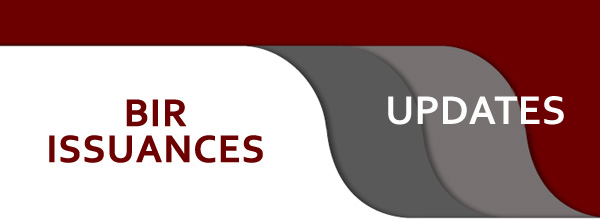
Revenue Regulations No. 10-2023 – Amends certain provisions of RR No. 6-2019, as amended, to implement the extension on the period of availment of the Estate Tax Amnesty pursuant to RA No. 11956, further amending RA No. 11213 (Tax Amnesty Act), as amended by RA No. 11569
Revenue Regulations No. 10-2023, issued on September 8, 2023, amends certain provisions of RR No. 6-2019, as amended, to implement the extension on the period of availment of the Estate Tax Amnesty pursuant to RA No. 11956, further amending RA No. 11213 (Tax Amnesty Act), as amended by RA No. 11569.
It is provided under the said Regulation that the Estate Tax Amnesty Return (ETAR) (BIR Form No. 2118-EA) (Annex B) shall be filed and paid, either electronically or manually, by the executor or administrator, legal heirs, transferees or beneficiaries, who wish to avail of the Estate Tax Amnesty within June 15, 2023 until June 14, 2025 with any authorized agent bank, through revenue collection officer of any Revenue District Office (RDO) or authorized tax software provider as defined in Revenue Memorandum Order (RMO) No. 8-2019.
The duly accomplished and sworn ETAR, together with the Acceptance Payment Form (APF-BIR Form No. 0621-EA) (Annex C) and the complete documents shall be presented to the concerned RDO.
Revenue Regulations No. 10-2023 –
This prescribes the mandatory requirements and guidelines, policies and procedures in the processing of claims for Value-Added Tax (VAT) Credit/Refund except those under the authority and jurisdiction of the Legal Group.
Revenue Regulations No. 10-2023, issued on September 14, 2023, provides that pursuant to Section 244, in relation to Section 245, of the National Internal Revenue Code of 1997, as amended, and taking into account Republic Act (RA) No. 8792, or the Electronic Commerce Act of 2000, the Rules on Electronic Evidence as well as the 2019 Amendments to the 1997 Rules of Civil Procedure, this Regulation is hereby promulgated for the purpose of implementing Section 208, in relation to Section 209 of the same Code, regarding the authority of the Commissioner of Internal Revenue to enforce collection of delinquent internal revenue tax liabilities, in particular, the use of electronic mail (e-mail) and electronic signature as additional mode of service of the Warrants of Garnishments (WGs).
Service thru e-mail is complete at the time of such e-mail is made, or, when available, at the time that the electronic notification of service of the WGs is sent.
Revenue Memorandum Circular No. 91-2023 –
Circularizes the amendment to Rule 18, Section 5 of the Implementing Rules and Regulations (IRR) of RA No. 11534 (Corporate Recovery and Tax Incentives for Enterprises (CREATE) Act)
Revenue Memorandum Circular No. 91-2023, issued on September 11, 2023, provides amendments to Rule 18, Section 5 of the Implementing Rules and Regulations (IRR) of RA No. 11534 (Corporate Recovery and Tax Incentives for Enterprises (CREATE) Act), to wit:
“PROVIDED, THAT REGISTERED EXPORT ENTERPRISES AS DEFINED UNDER SECTION 293(E) OF THE ACT WHOSE INCOME TAX-BASED INCENTIVES HAVE EXPIRED, MAY CONTINUE TO ENJOY VAT ZERO-RATING ON LOCAL PURCHASES UNTIL THE ELECTRONIC SALES REPORTING SYSTEM FO THE BUREAU OF INTERNAL REVENUE UNDER SECTION 237-A OF THE ACT IS FULLY OPERATIONAL, OR UNTIL THE EXPIRATION OF THE TRANSITORY PERIOD REFERRED TO IN SECTION 311(C) OF THE ACT, WHICHEVER COMES EARLIER; PROVIDED, FURTHER, THAT AN RBE CLASSIFIED AS DME WHICH IS LOCATED INSIDE THE ECONOMIC OR FREEPORT ZONE DURING THE TRANSITORY PERIOD WILL BE ALLOWED TO REGISTER AS A VAT TAXPAYER;”
Revenue Memorandum Circular No. 92-2023–
Announces the availability of BIR Form No. 1621 in the Electronic Filing and Payment System (eFPS)
Revenue Memorandum Circular No. 92-2023, issued on September 13, 2023, announces the availability of BIR Form No. 1621 (Quarterly Remittance Return of Tax Withheld on the Amount Withdrawn from Decedent’s Deposit Account) in the Electronic Filing and Payment System (eFPS).
The aforementioned BIR Form is required to be filed and the tax due thereon be paid or remitted not later than the last day of the month following the close of the quarter during which withholding was made.
All mandated EFPS taxpayers who are required to file the said return and pay the corresponding tax due thereon, if any, shall use the EFPS facility effective immediately.
Revenue Memorandum Circular No. 93-2023 –
Publishes the Updated List of registered manufacturers/importers/exporters with the corresponding product brands/variants of cigarettes, heated tobacco products, vapor products and novel tobacco products and integration of the requirements for compliance purposes
Revenue Memorandum Circular No. 94-2023 –
Announces the availability of Online Customer Satisfaction Survey in the Online Registration and Update System (ORUS)
Revenue Memorandum Circular No. 94-2023, issued on September 13, 2023 announces the availability of Online Customer Satisfaction Survey in the Online Registration and Update System (ORUS) starting September 5, 2023.
Revenue Memorandum Circular No. 97-2023 -
Provides tax compliance reminders to all candidates and other participants in any national or local elections, including Barangay or Sangguniang Kabataan (SK) Elections
Revenue Memorandum Circular No. 97-2023, issued on September 22, 2023, provides tax compliance reminders to all candidates and other participants in any national or local elections, including Barangay or Sangguniang Kabataan (SK) Elections.
It reminds all candidates to maintain a record of contributions, donations, and expenditures, which will be used for the Statement of Contributions and Expenditures submitted to COMELEC pursuant to RR No. 8-2009.
Furthermore, all candidates receiving donations and campaign contributions shall purchase from the RDO where they are registered, the Non-VAT BIR Printed Receipts to be issued for every contribution in cash or in kind. For contribution in kind, it shall be valued at fair market value.
All candidates who fail to register and comply with the requirements of the BIR will be subjected to penalties under existing laws and issuances.
Revenue Memorandum Order No. 33-2023 -
Reiterates Section 3.J of RR No. 17-2003 on the withholding of taxes for the sale of real property on installment plan.
Revenue Memorandum Order No. 33-2023 issued on September 29, 2023, reiterates Section 3.J of RR No. 17-2003 on the withholding of taxes for the sale of real property on installment plan.
Revenue Officers assigned in the processing of One-Time Transaction (ONETT) are mandated to strictly monitor all installment sale transactions of real properties and in no case that an electronic certificate authorizing registration (eCAR) be issued to the buyer unless the withholding tax due on the sale, transfer, or exchange of real property, including penalties, if any, has been fully paid.


SEC MC No. 13, series of 2023, and published on September 12, 2023 -
Provides guidelines on Annex C of Rule 12 of the Securities Regulation Code Interpreting the comparative periods required in the Management’s Discussion and Analysis.
| Financial Statements ("FS") line items | 2022 | 2021 | Change | % of Change |
| xxx | xxx | xxx | % |
Changes in Financial Condition and/or Results of Operations
(Comparative balances for December 31, 2021 and December 31, 2020)
| Financial Statements ("FS") line items | 2022 | 2021 | Change | % of Change |
| xxx | xxx | xxx | % |
SEC MC No. 14, series of 2023, and published on September 19, 2023
Provides proposed Amendments to Annex C of Rule 12 of the Securities Regulation Code.
This introduced the following amendments in provisions of Annex C, Rule 12 of the Securities Regulation Code (SRC):
(xv) Discuss the major risk/s involved in each of the businesses of the company and subsidiaries. The Company may include disclosure of the procedures to identify, assess, and manage such risks.
xxx
(C) Risk Factors.
xxx
The Registrant may indicate measures to mitigate the risks mentioned above.
SEC MC No. 16, series of 2023, and published on September 19, 2023
Provides revised guidelines on the determination of Retained Earnings Available for Dividend Declaration.
SEC MC No. 17, series of 2023, and published on September 29, 2023
Further extends the Amnesty Applications Until 06 November 2023.
This provides that the SEC shall continue to accept an Expression of Interest (EOI) to avail of the amnesty from eligible corporations, until 06 November 2023 through eFAST.
Hence, corporations are given only until 06 November 2023 to signify their intent to apply for amnesty and settle corresponding amnesty fees.
The period from 07 November 2023 to 04 December 2023 shall only be dedicated to the submission of supporting reportorial documents for all applications. Failure to comply within the submission period shall warrant the forfeiture of the paid amnesty or filing fees in favor of the Commission.
In view of the foregoing amnesty extension, the updated scale of fines and penalties for the covered reportorial requirements shall be implemented on 07 November 2023.

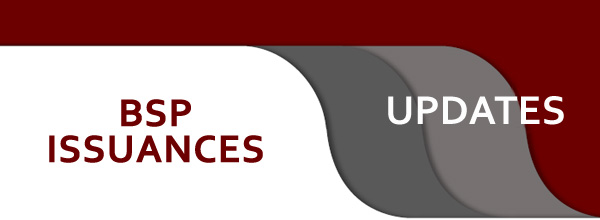
Legal Opinion No. 2023-18 dated September 8, 2023
This Circular provides for the reduction in reserve requirement ratios of deposit and deposit substitute liabilities of banks and non-bank financial institutions with quasi-banking functions.
The pivotal issue in the instant case is whether or not the practice of charging higher premiums or limiting coverage for senior citizens is discriminatory.
The Insurance Commission (IC) ruled in the negative.
Underwriting plays a significant role in determining how much a person should pay to be covered and his coverage eligibility. lt involves assessing the risk profile of individuals to determine the appropriate premium and coverage terms. For health insurance, including HMOs, underwriters consider various factors that influence a person's potential healthcare costs.
Age is often a key factor because it correlates with changes in health risks and
healthcare needs. As people age, they are more likely to experience health issues and require medical services. This consideration can lead to hlgher premiums for older individuals to reflect the higher expected costs associated with their age-related health conditions.
Actuarial data also plays a part in the assessment of risk, projection of costs, and
calculation of premiums of HMOs. ln the approval of HMO products, this Commission requires the submission of actuarial notes, actuarial formulations, and other documents that are required to be signed by an actuary accredited by this Commission.
The submission of these actuarial formulations and studies is to ensure the adequacy and fairness of membership fees to be collected by HMOs. This data-driven approach helps HMO companies maintain financial stability and offer equitable pricing while ensuring the viability of their products.
While the practice of charging higher premiums or limiting coverage for senior citizens may seem unfair on the surface, it is important to consider the actuarial and underwriting principles that underpin such decisions. Hence, as long as these decisions are based on legitimate risk assessment, there can be no arbitrary discrimination against senior citizens in availing of HMO products.

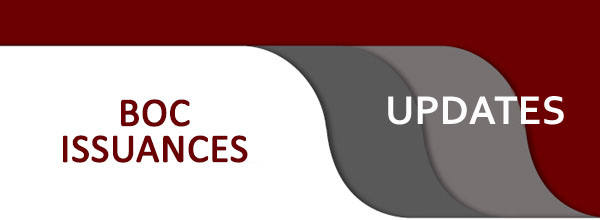
Customs Memorandum Order No. 15-2023 dated September 5, 2023 – This further amends Customs Memorandum Order (CMO) No. 04-2020 Re: Establishment of an Electronic Tracking of Containerized Cargo System (E-TRACC System) and Accreditation of a Service Provider for the purpose.
To streamline and improve the implementation of Electronic Tracking of Containerized Cargo System (E-TRACC System), BOC shall now have an E-TRACC System dashboard showing the data collected and transmitted by the E-TRACC System Service Provider. This will allow the Bureau to monitor the movement and location of all containers as well as get real time alarms both on the dashboard and by e-mail. Access to the E¬TRACC System dashboard shall be given to the Commissioner, Deputy Commissioner, Assessment and Operations Coordinating Group (AOCG), Director, Enforcement and Security Service (ESS), District Collectors, and Deputy Collector for Operations.
The E-TRACC Service Provider shall likewise submit a weekly report through e-mail to the Deputy Collector for Operations and Chief, Piers and Inspection Division or equivalent office of both the Port of Discharge and Port of Destination all bookings for E-TRACC.
The status report of bookings shall be updated every Tuesday of the week.
The E-TRACC Service Provider shall draft the amendment to the Service Level Agreement (SLA) to reflect the changes as provided in this Order, subject to the approval of the Bureau.
The E-TRACC SL shall be subject to review every year for possible amendments.
COCOM memo 58-2023 dated September 5, 2023
This provides guidance on the strict use of Multi-Currency Counting and Printing Machines in the 100% verification of currencies declared in the Currencies Declaration Form by Travelers and Crew arriving and departing in all seaport and airports.
This directed all concerned personnels to STRICTLY USE THE MULTI-CURRENCY COUNTING AND PRINTING MACHINES IN THE 100% VERIFICATION OF CURRENCIES found in accompanied and unaccompanied baggages, cargoes, mails, and parcels and/or declared by arriving and departing travelers and crews in the Currencies Declaration Form, in line with Section 6.7.1 of Customs Memorandum Order (CMO) No. 11-2012 in relation to CMC No. 89-2022: Implementation of Bangko Sentral ng Pilipinas Circular No. 1146, series of 2022 or the amendments to the Rules on Cross-Border Transfer of Local and Foreign Currencies.


FIRB Advisory 016-2023, September 14, 2023
This provides guidance on the availability of the updated templates for the Annual Tax Incentives Report (ATIR) and Annual Benefits Report (ABR) of cooperatives.
This provides the updates on the Annual Tax Incentives Report (ATIR) and Annual Benefits Report (ABR) of cooperatives.
Updated templates for the ATIR and ABR of Cooperaves (i.e., FIRB Form No. 3003AS v2.0 dated 14 September 2023) may now be downloaded from the FIRB website through the following link:
hps://firb.gov.ph/download/firb-form-no-3003as-ar-and-abr-of-cooperaves/
The updated templates shall be used by registered cooperaves availing of tax incenves in subming the complete ATIR and ABR (Annexes A and B) to the CDA, and by the CDA in subming the consolidated ATIR and ABR and masterlist of cooperaves (Annexes C, D and E), beginning Taxable Year 2023 as prescribed under DOF-DTI JAO No. 001-2023 and under FIRB Advisory No. 007-2023.

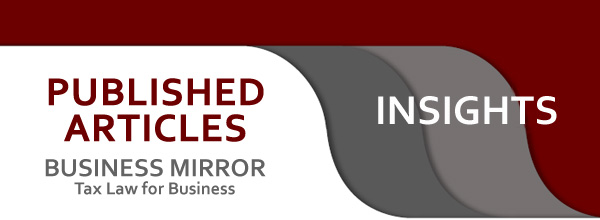
VAT on Incidental Transactions
By Atty. Fulvio D. Dawilan
In our value-added tax (VAT) system, the imposition of VAT is anchored on the basic principle that any person who sells goods and services, in the course of trade of business, shall be subject to VAT. What are subject to VAT are transactions done in the course of trade or business. Apparently, the phrase “regular course of trade or business" covers not only those pursued in the regular conduct or pursuit of a commercial or economic activity but also includes transactions incidental thereto. Incidental transactions are therefore covered by the VAT regime if the main business activity is subject to VAT.
Recall that in the past, the Courts declared that isolated transactions are not subject to VAT. In one case (G.R. No. 146984, July 28, 2006), vessels were acquired and leased in the ordinary course of business of the owner. The subsequent sale of the vessels was not considered to have been done in the course of the seller’s business as it was involuntary and was made because of the government’s privatization program. Accordingly, this isolated transaction was treated as not subject to VAT. Similarly, in G.R. No. 198146, August 8, 2017, the Court ruled that the sale of power plants was not in the pursuit of a commercial or economic activity but a governmental function mandated by law to privatize assets. It was not "in the course of trade or business" as contemplated under the VAT law, and thus, not subject to VAT.
However, there were also instances where one-time transactions involving sale of assets were considered as subject to VAT. In G.R. No. 193301, March 11, 2013, a vehicle was bought and used in business. It became part of the taxpayer’s property and equipment and later but later sold when it was fully depreciated. The Court noted that the sale of the motor vehicle was an isolated one, the main business of the seller being in power generation and not in the business of selling motor vehicles. Nonetheless, it was an incidental transaction made in the course of the taxpayer’s business, which should be liable for VAT. According to the Court, it does not follow that an isolated transaction cannot be an incidental transaction for purposes of VAT liability.
So when are transactions treated as incidental? What are the transactions that should be embraced by the term “incidental” within the context of the VAT law? And when are incidental transactions subject to VAT?
A more recent case (G.R. No. 186155, January 17, 2023) provides a more enlightening answer. This case involves a taxpayer that was engaged primarily in the business of providing management services – managing, promoting, administering or assisting businesses. It was assessed VAT liability on the interest income derived from the advances made to affiliates. As expected, the taxpayer argued, among others, that the granting of loans or advances to affiliates were not done in the course of trade or business. A transaction would only be subject to VAT if done regularly or in pursuit of a commercial or economic undertaking. Neither was the granting of loans – which was made occasionally to accommodate affiliates with no existing credit lines with banks - incidental to its primary business activities.
In resolving the controversy, the Court declared that, for VAT to apply, the activity may not always be pursued with regularity or habituality. VAT may still be imposed even if the transaction is merely occasional or isolated. And this is particularly true to transactions that are incidental to the main business activity. While the primary or main activity is characterized by regularity, that which is incidental to it may be conducted only occasionally. Although merely occasional or isolated, a transaction may still be embraced in the definition of “in the course of trade or business”, so long as the transaction is incidental to the seller’s main business activity.
As further clarified, however, for a transaction to be considered incidental to the main business activity, it is imperative that there must be intimate connection between the transaction and the main business activity. In this particular case, the Court found that there was no showing of a connection between the granting of financial assistance/loans and the primary purpose of providing management services. Accordingly, the interest income derived from such loans are not subject to VAT.
In summary, echoing earlier decisions, the Supreme Court stated that the VAT applies to sale of services in the course of trade or business which includes incidental transactions. It does not follow that an isolated transaction cannot be an incidental transaction for purposes of VAT liability. However, it must be clearly established that the transaction in question must be related or connected with the conduct of the main business activity which is subject to the VAT.
There is no doubt that “incidental transactions” are embraced within the phrase “in the course of trade or business”, making said transactions subject to VAT. That transaction could be isolated or not, regularly conducted or not. But not all transactions pursued by a taxpayer are to be treated as incidental for VAT purposes. To be incidental, the undertaking must be related to the main business activity which is subject to VAT.
The important consideration, therefore, for an activity to be considered incidental and subject to VAT as the main activity is its connection to the main business activity. If there is none, it could not be considered incidental and should be free from VAT. If it is, VAT should be imposed as a necessary consequence.
----------------------------------------------
For inquiries on the article, you may call or email
ATTY. FULVIO D. DAWILAN
Managing Partner
T: +63 2 8403 2001 loc. 310
This email address is being protected from spambots. You need JavaScript enabled to view it.



DISCLAIMER: The contents of this Insights are summaries of selected issuances from various government agencies, Court decisions and articles written by our experts. They are intended for guidance only and as such should not be regarded as a substitute for professional advice.
Copyright © 2023 by Du-Baladad and Associates (BDB Law). All rights reserved. No part of this issue covered by this copyright may be produced and/or used in any form or by any means – graphic, electronic and mechanical without the written permission of the publisher.






